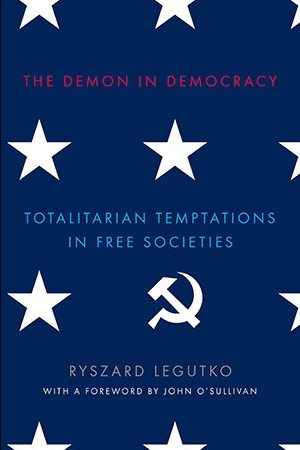 “Happy the man that understands the causes of things,” wrote Virgil. Polish philosopher Ryszard Legutko, who is also a Member of the European Parliament, is one of those deep thinkers who likes to get to the root of matters. He is not content with superficial observations or political platitudes. In his new book, The Demon in Democracy: Totalitarian Temptations in Free Societies, he takes on the challenges of where the post-Cold War program went wrong.
“Happy the man that understands the causes of things,” wrote Virgil. Polish philosopher Ryszard Legutko, who is also a Member of the European Parliament, is one of those deep thinkers who likes to get to the root of matters. He is not content with superficial observations or political platitudes. In his new book, The Demon in Democracy: Totalitarian Temptations in Free Societies, he takes on the challenges of where the post-Cold War program went wrong.
He has all the qualifications to make such an appraisal. Having lived and suffered under communism for decades, Legutko played a major role in the movement to bring down communism in Poland. When the Iron Curtain fell in 1989, he joined many in thinking that it would signal the end of conflict and the triumph of freedom.
He soon found out that the new liberal Western-style order that replaced the old communist regime did not live up to these expectations. He was shocked to learn how many were hostile to his anti-communist position. He was mystified by the sympathy and favor enjoyed by so many former communists and socialists.
That is when Legutko looked at the roots of things. He began to wonder why communist persecution of the Church had failed while its later counterpart “without any effort and simply by allowing people to drift along with the flow of modernity succeeded.” He was familiar with communism’s militant anti-Catholic boot but not modernity’s strong cultural intolerance.
With penetrating analysis, he concludes that communism and liberal modernity have common philosophical roots although they follow different methods. “Modernity and anti-Christianity cannot be separated,” he affirms, “because they stem from the same root and since the beginning have been intertwined.”
 What is so refreshing about Legutko’s analysis is its depth and originality. He refuses to fight on the enemy’s turf by reducing everything to just politics. He delves deeply into his subject and finds the two systems, communism and liberal modernity, share in their own vastly different ways a common vision of history, society, religion, politics, culture, and human nature.
What is so refreshing about Legutko’s analysis is its depth and originality. He refuses to fight on the enemy’s turf by reducing everything to just politics. He delves deeply into his subject and finds the two systems, communism and liberal modernity, share in their own vastly different ways a common vision of history, society, religion, politics, culture, and human nature.
In his analysis of what went wrong in the East, he ironically helps explain what went wrong in the West. From the very beginning, the modern experiment carried within itself the seeds of its own decadence. As it reaches its final stages, modernity has produced its neo-barbarians who are turning upon their culture and rejecting its established norms of behavior.
Modernity’s problem is that it is all so cultural and therefore so imperceptible. That is why Legutko’s focus on culture is important. He traces how what he calls liberal-democratic thought did much to change the culture, secularize the West and legitimize “a lowering of human expectations.” He notes that this current did not progress by radical outbursts but by gradually breaking down “the social hierarchies, customs, traditions, and practices that had existed prior to the emergence of the new political system.”
Over the last few decades, the West has spread this decaying process to the East. Legutko laments “a gradual sliding down from the high to the low, from the refined to the coarse,” which has brought vulgarity to language, behavior, education, and moral rules. It has given rise to an anti-culture of frenetic intemperance and instant gratification that has helped corrode and smother remnants of faith still alive.
The author enters into other areas of concern that have an eroding effect on society. The modern sense of entertainment, for example, has led to a shallowness of life that permeates all aspects of life, “separates us from the seriousness of existence, and fills this existence with false content.”
These and other insights are so accessible because they are observable in daily life. He manages to deal with everything from political correctness to modern feminism. There is a logic to Legutko’s arguments that allows the reader to perceive not only causes but also ultimate goals. Thus, it appears that not only do the two systems have common historical and cultural roots but also a common enemy: the Catholic Church and its social structures.
Legutko affirms that “There is virtually no area in which the influence of Christianity has not been challenged. Everything that Christianity imbued with its spirit, legacy and wisdom—education, morality, sensibility, human conduct, even diet—the liberal-democratic order put to question and in many cases eliminated.”
Legutko is unduly pessimistic about the future, perhaps because he is impressed by the tragic grandeur of this struggle. He cannot see beyond the terrible totality of the liberal democratic ideal that so dominates everything around him.
Although not mentioned in the book, it would be better to see this great battle over the culture as a supercharged version of the age-old fight of Christ against the world, flesh and the devil. Perhaps the merit of The Demon in Democracy lies precisely in its unvarnished portrayal of modernity. By contrast, it becomes evident that the solution can only come from a much greater supernatural power.
As seen on Crisis Magazine.
